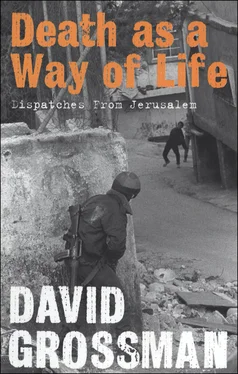David Grossman - Death as a Way of Life
Здесь есть возможность читать онлайн «David Grossman - Death as a Way of Life» весь текст электронной книги совершенно бесплатно (целиком полную версию без сокращений). В некоторых случаях можно слушать аудио, скачать через торрент в формате fb2 и присутствует краткое содержание. Год выпуска: 2013, Издательство: Bloomsbury Publishing, Жанр: Прочая документальная литература, на английском языке. Описание произведения, (предисловие) а так же отзывы посетителей доступны на портале библиотеки ЛибКат.
- Название:Death as a Way of Life
- Автор:
- Издательство:Bloomsbury Publishing
- Жанр:
- Год:2013
- ISBN:нет данных
- Рейтинг книги:5 / 5. Голосов: 1
-
Избранное:Добавить в избранное
- Отзывы:
-
Ваша оценка:
- 100
- 1
- 2
- 3
- 4
- 5
Death as a Way of Life: краткое содержание, описание и аннотация
Предлагаем к чтению аннотацию, описание, краткое содержание или предисловие (зависит от того, что написал сам автор книги «Death as a Way of Life»). Если вы не нашли необходимую информацию о книге — напишите в комментариях, мы постараемся отыскать её.
Death as a Way of Life — читать онлайн бесплатно полную книгу (весь текст) целиком
Ниже представлен текст книги, разбитый по страницам. Система сохранения места последней прочитанной страницы, позволяет с удобством читать онлайн бесплатно книгу «Death as a Way of Life», без необходимости каждый раз заново искать на чём Вы остановились. Поставьте закладку, и сможете в любой момент перейти на страницу, на которой закончили чтение.
Интервал:
Закладка:
David Ervine, a Protestant leader who had been caught in the past with a live bomb in his hands, looked at Martin McGuinness, a Catholic leader, a man whom he had fought, who had been his bitter enemy. “There was a moment,” he said, “when I simply understood that this war cannot be won.” McGuinness nodded.
A sigh of relief passed among us, Israelis and Palestinians, relief at having become aware of a conclusion that was so simple, at having heard such a clear, longed-for formulation. But then we grew somber again. We made a quick computation: In Northern Ireland, it took eight hundred years to reach this obvious conclusion. Does that mean that we have another seven hundred years to wait?
(I meant to end the article here. But as I type this, the radio is announcing a warning that a terrorist with an explosive belt is now roaming the streets of Jerusalem. And again the stomach knots up, the thoughts race. You quickly scan your mental map of those dear to you — where is each of them at this particular moment? You visualize a huge roulette wheel, turning slowly, slowly, and then coming to a halt.)
Bad Fences Make Bad Neighbors
July 2002
Grassroots organizers and politicians from different sides of the political spectrum gained popular support in their campaign for unilateral withdrawal and the construction of a fence separating Israel from the Palestinian Authority’s territory. The proposed unilateral disengagement system would include fences, walls, electromagnetic sensors, guard towers, airborne surveillance, security patrols, and well-guarded checkpoints. It would not be considered a border. According to its supporters, the fence would serve as a barrier preventing terrorists in the West Bank and Gaza Strip from entering Israel. It would remain in place until a negotiated peace could be achieved with the Palestinians. Yet, even among its proponents, there was disagreement as to where the fence would run and how many Israeli settlements would be protected on its Israeli side. Ariel Sharon’s government finally approved the route of the first no kilometers of the fence in August 2002, but stipulated that none of the Israeli settlements outside it would be evacuated. As of December, only one kilometer of the planned fence has been built.
“Good fences make good neighbors,” wrote the poet Robert Frost. Israel and Palestine are certainly not good neighbors, and there is certainly an urgent need, both in practice and in principle, to establish a border between them. I mean a border with sophisticated defensive and barrier devices, open only at border crossings established by mutual consent. Such a border would protect them from each other, would help stabilize their relations and, especially, would require them to internalize, once and for all, the concept of a border. It’s a vague, elusive, and problematic concept for both of them, since they’ve lived for the last hundred years without clear boundaries, with constant invasion, each within, on top of, over, and under the other.
Yet, in my opinion, it would be very dangerous to establish such a border fence right now, unilaterally, without a peace agreement of any kind, while the principal points are still in heated dispute, before the two sides have truly exhausted all the possibilities for dialogue between them. The establishment of a fence now, even if it reduces the number of terrorist attacks for a certain period, is another precipitate action aimed at giving the Israeli public a temporary illusion of security. Its main effect would be to supply Israelis with a counterfeit replacement for a peace process which requires difficult and painful compromises.
There may well come a time — after both sides have attempted another serious and sincere move toward peace — when Israel will reach the conclusion that there really is no chance of peace in this generation. In such a case, Israel will have to withdraw from the occupied territories, evacuate almost all the settlements, shut itself behind a thick wall, and prepare for an ongoing battle.
From my conversations with Palestinian leaders, however, I am convinced there still is a chance for peace. And as long as there is a chance, even a slight one, Israel may not make its choice of last resort.
Most Israelis disagree. They think we’ve already reached that point. “There’s no one to make an agreement with!” they say. “Even Shimon Peres and the leaders of the left say that they are no longer willing to talk with Arafat, and in the meantime, Israel must defend itself against terror somehow!”
But even if we assume that Arafat is not a partner (by the way, it certainly hasn’t been proven that Sharon is a willing partner either), we need to examine the practical implications of the establishment of a barrier fence without an agreement. They are grave enough to make such a unilateral move unwise, unless there really is no other alternative.
It is clear to everyone that such a fence would not prevent, for example, the Palestinians firing rockets and mortars from their territory into Israel. If Israel closed itself off behind a fence, the Palestinians would be able to invite in “aid” from foreign armies — from Iran, for example, or Hezbollah. The Israeli Army would have to operate beyond the fence, in order to defend isolated Israeli settlements that remained on the other side. It takes little imagination to realize what military complications this would lead to.
The fence would not provide an appropriate military response to the complex situation in Jerusalem, in which Jews and Arabs live adjacent to one another, rubbing shoulders each day. On the contrary. An attempt to detach East Jerusalem from the rest of the Palestinian territories is liable to turn the Arab city’s inhabitants — who, up until now, have seldom been direct participants in acts of terrorism — into active partners in the Palestinian struggle.
People will counter me by asking, What do you propose to do in the meantime, until conditions are ripe for an agreement? Isn’t it better to build the fence, so that we can block, at least partially, terrorist attacks?
I wish I could believe that the fence would ward off even some of the attacks in the long run. My fear is that, without a peace process, the attacks it would stop in the short run would simply appear in another, more permeable place. Given the intensity of the conflict, any wall would be a sieve with plenty of gaping holes.
The distress Israelis feel is constant and comprehensible. It derives from the inhuman cruelty of the suicide bombings — the very real threat to one’s personal safety — and from the feeling that there is no end in sight, given the huge support for terrorism in the Palestinian public. But this distress cannot overcome the sense that the Israeli infatuation with the fence is the product of a psychological need. It is not a well-considered diplomatic and military policy.
In establishing a fence unilaterally, Israel is, after all, throwing away the major card it has to play. It would be discarding this trump without receiving anything in return from the Palestinians, while the conflict and Palestinian demands and wounds are still at a boil. Yasir Abd Rabbo, the Palestinian minister of information, said last month in a conversation with Israelis from the peace camp: “If you withdraw behind the fence, we will spend a day celebrating that most of the occupation has ended, and the next day we will continue the Intifada, in order to obtain the rest of our demands.”
Those other demands are well known: Israeli withdrawal from 100 percent of the territories Israel occupied in the 1967 War; evacuation of all the settlements; Arab Jerusalem as the capital of Palestine; and acceptance of the principle of the Palestinian refugees’ right of return within Israel proper.
Читать дальшеИнтервал:
Закладка:
Похожие книги на «Death as a Way of Life»
Представляем Вашему вниманию похожие книги на «Death as a Way of Life» списком для выбора. Мы отобрали схожую по названию и смыслу литературу в надежде предоставить читателям больше вариантов отыскать новые, интересные, ещё непрочитанные произведения.
Обсуждение, отзывы о книге «Death as a Way of Life» и просто собственные мнения читателей. Оставьте ваши комментарии, напишите, что Вы думаете о произведении, его смысле или главных героях. Укажите что конкретно понравилось, а что нет, и почему Вы так считаете.












